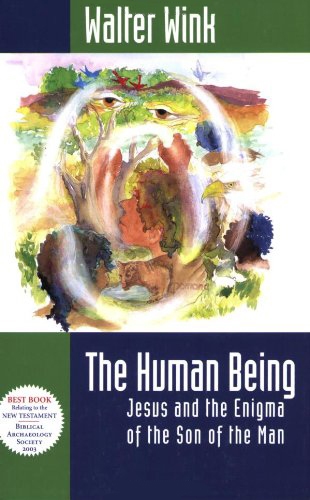In his interpretations of Jesus and his self-references as the Son of Man, New Testament scholar Walter Wink presents a radical Christology. Here's a passage on the spiritual practice of you.
"As long as the disciples were enthralled by Jesus' powers, however, they would not be able to find those powers in themselves. Mark contains a fascinating series of stories that address that problem.
"In the first narrative, the Stilling of the Storm (Mark 4:35-41 par.), Jesus sleeps in the stern of a fishing boat as he and his disciples cross the Sea of Galilee. When a sudden storm threatens to swamp the boat, the disciples wake him, shouting, 'Teacher, do you not care that we are perishing?' Jesus condescends; he bears their projections and rebukes the wind: 'Be silent! Be muzzled!' as if it were a demon. The wind was a demon, but not meteorologically. It was demonic only in the disciples. They had no doubt exercised heroism countless times before in storms — the Sea of Galilee was notorious for such. Where had their courage fled this time? Jesus had stolen it. More accurately, they had given up their courage by entering into dependency on Jesus. So they experienced the storm not as a challenge, but as an evil threat, and they even accuse Jesus of unconcern for their survival.
"Jesus chastises them: 'Why are you such cowards (deiloi)? Have you still no faith?' Faith in what? What had he expected of them? They are the sailors; they know this lake like the palm of their hand and have weathered innumerable storms. Waking him to bail would have made sense; why do they wake him just to accuse him of indifference? And what did Jesus want from them? What difference would faith have made?
"Apparently Jesus thinks (as the story has it) that the disciples should have been able to deal with this crisis themselves. But they had never seen a storm stilled before, much less stilled a storm themselves. So he rebukes the wind and sea. 'Have you no faith?' must mean something like, 'Next time, take care of it yourselves and let me sleep!' In perfect accord with Feuerbach's critique of religion, the disciples are unable to locate power in themselves sufficient for the challenge. When they see Jesus exercising that power, they assume that the power is localized in him: It is Jesus' power. By chastising them for lacking faith, Jesus is trying to throw the issue back on them: the power is within you; use your faith! But he gets the opposite result. The disciples are swept off their feet in adulation: 'And they were filled with great awe and said to one another, "Who then is this, that even the wind and the sea obey him?" '
"Such a response requires the impatient patience of the spiritual guide. The disciples cannot know that the messianic powers dwell in themselves as well as in Jesus. They have been taught that a powerful charismatic leader, soon to come, will possess these powers. Their job is to conform, to assent, to follow. That these powers might be theirs as well has never dawned on them. They have, in fact, been trained not to believe that such abilities lay within their reach. They have been taught not to seek power in themselves. The Powers want people pliant. The religious authorities tend to want their devotees passive. Leaders do not want empowered people; they want trustworthy followers. How interesting that Jesus has chosen disciples from the margins of society, people not caught up in the power game. He wants to be the torch to their tinder, to set them on fire for God: 'I came to bring fire to the earth, and how I wish it were already kindled!' (Luke 12:49). But this kindling is soggy and will require drying out. Irritation jostles with compassion as the teacher struggles to awaken the disciples to the Divine Wisdom within."
